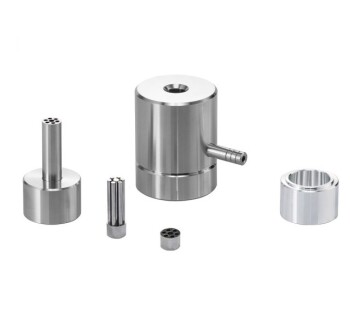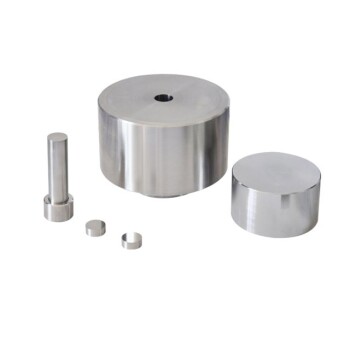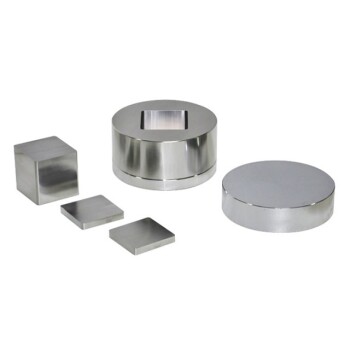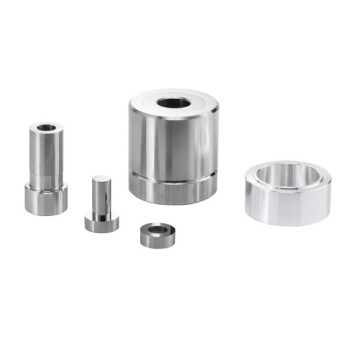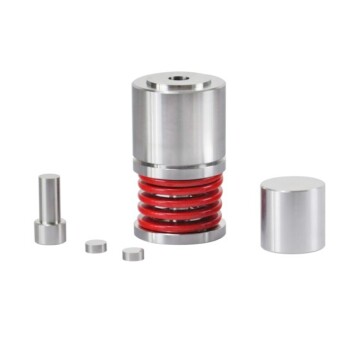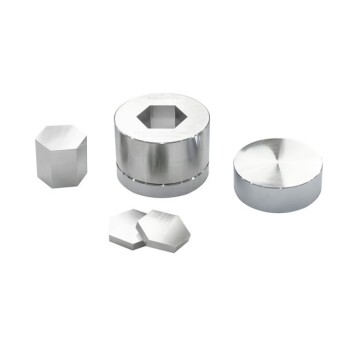In short, laboratory presses use a combination of precisely controlled heat and pressure to transform biobased resins from a liquid or powder into a solid, durable material. This process, known as curing, is essential for creating strong, uniform composite materials for applications like sustainable cross-laminated timber (CLT).
The true role of a laboratory press is not just to cure the resin, but to provide a highly controlled and repeatable environment. This allows researchers to test, optimize, and validate new biobased formulations, ensuring they can perform reliably before being used at an industrial scale.

The Core Function: Applying Controlled Heat and Pressure
A laboratory press allows researchers to meticulously manage the two most critical variables in the curing process: temperature and force. This control is fundamental to turning a promising bioresin formulation into a viable material.
Simulating Production Conditions
A lab press serves as a miniature version of a large-scale industrial press. It enables researchers to simulate and perfect the manufacturing process on a small, manageable scale.
This saves significant time and resources by avoiding costly trials on full-sized production lines.
Initiating the Curing Reaction
Heat acts as the catalyst for the curing reaction. The heated plates, or platens, of the press transfer thermal energy to the resin, initiating a chemical process called cross-linking.
This process transforms the individual polymer chains in the resin into a rigid, three-dimensional network, giving the final material its strength and stability.
Ensuring Uniform Consolidation
Pressure is equally critical. As the press applies force, it serves several key functions. It ensures the resin flows evenly and makes intimate contact with the base material, such as wood fibers.
Most importantly, it squeezes out any trapped air or volatile byproducts, preventing voids that would otherwise create weak points. This results in a dense, homogenous sample, which is vital for accurate material testing.
Why a Lab Press is Essential for Bioresin Development
The development of new, sustainable materials is an iterative process of formulation and testing. A lab press is the central piece of equipment that makes this possible.
Optimizing Cure Cycles
For any new biobased resin, the ideal curing parameters are unknown. Researchers use the lab press to experiment with different temperature ramps, hold times, and pressure levels.
The goal is to find the most efficient "recipe" that achieves a full cure in the shortest time and with the least amount of energy, which is a key factor in sustainability.
Characterizing Material Properties
To determine if a new resin is viable, it must be tested. A lab press is used to create perfectly consistent and uniform samples, such as compressed pellets or thin films.
These standardized samples are then subjected to further analysis—such as mechanical strength tests or spectroscopy—to measure their properties. Without a uniform sample, test results would be unreliable.
Validating New Formulations
Lab presses are used to study how materials behave under extreme conditions, mimicking forces they might encounter in real-world applications.
By creating and testing samples, researchers can validate that a new biobased resin meets the performance standards required for its intended use, whether in construction, automotive, or other industries.
Understanding the Trade-offs and Key Parameters
Achieving a perfect cure is a balancing act. The precision of the lab press is what allows researchers to navigate these complexities.
The Balance of Heat and Pressure
Too much heat can degrade the organic components of a biobased resin, while too little will result in an incomplete cure. Likewise, too much pressure can crush the substrate (like wood fibers), while too little will fail to consolidate the material properly.
Platen Temperature Uniformity
The heated platens of the press must maintain a perfectly even temperature across their entire surface. Any "cold spots" will lead to under-cured areas, creating structural weaknesses in the final product.
The Challenge of Scalability
A formulation that works perfectly in a small lab press may behave differently in a large industrial press due to variations in heat transfer and pressure distribution. Bridging this gap between the lab and the factory is a critical step in the commercialization process.
How to Apply This to Your Research
The way you use a lab press depends entirely on your end goal.
- If your primary focus is new formulation development: Prioritize a press with highly precise temperature and pressure controls to test the widest possible range of cure cycles.
- If your primary focus is quality control: Choose a press that offers exceptional repeatability to ensure every sample you create is consistent for accurate analysis.
- If your primary focus is simulating industrial processes: Select a press that allows you to program multi-stage cycles with varying temperature ramps and pressure levels to mimic a real-world production environment.
Ultimately, mastering the laboratory press is fundamental to developing and validating the next generation of high-performance sustainable materials.
Summary Table:
| Key Aspect | Role in Curing Biobased Resins |
|---|---|
| Heat Control | Initiates cross-linking reactions for strength and stability |
| Pressure Application | Ensures uniform consolidation and removes air voids |
| Process Simulation | Mimics industrial conditions for scalable development |
| Sample Creation | Produces homogenous samples for accurate material testing |
| Parameter Optimization | Allows testing of temperature, pressure, and time for efficiency |
Ready to elevate your biobased resin research? KINTEK specializes in lab press machines, including automatic lab presses, isostatic presses, and heated lab presses, designed to meet the precise needs of laboratories. Our equipment ensures reliable, repeatable curing processes, helping you optimize formulations and accelerate sustainable material development. Contact us today to discuss how our solutions can enhance your lab's efficiency and innovation!
Visual Guide

Related Products
- Automatic High Temperature Heated Hydraulic Press Machine with Heated Plates for Lab
- Laboratory Manual Heated Hydraulic Press Machine with Hot Plates
- Manual Heated Hydraulic Lab Press with Integrated Hot Plates Hydraulic Press Machine
- Lab Heat Press Special Mold
- Automatic Heated Hydraulic Press Machine with Hot Plates for Laboratory
People Also Ask
- What industrial applications does a heated hydraulic press have beyond laboratories? Powering Manufacturing from Aerospace to Consumer Goods
- How does using a hydraulic hot press at different temperatures affect the final microstructure of a PVDF film? Achieve Perfect Porosity or Density
- What is a heated hydraulic press and what are its main components? Discover Its Power for Material Processing
- What is the core function of a heated hydraulic press? Achieve High-Density Solid-State Batteries
- Why is a hydraulic heat press critical in research and industry? Unlock Precision for Superior Results








